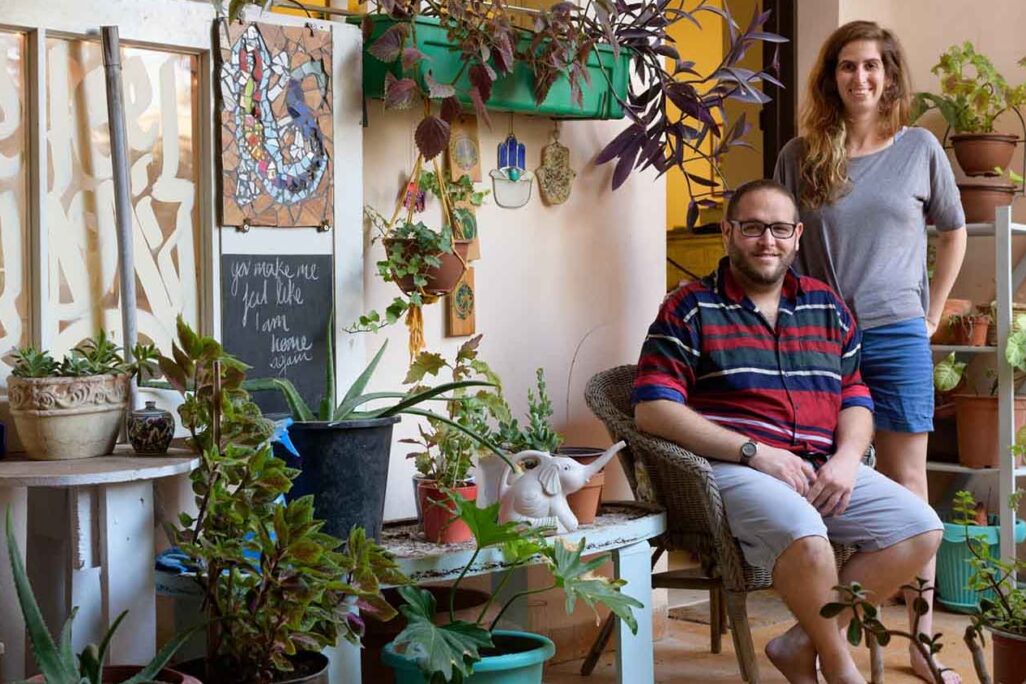
This article is the second in a series called “Living Together,” exploring how different kinds of Israelis share their neighborhoods and their lives.
Number 46 Masada Street looks just like all the other buildings on the street. A little old, a little renovated, cars parked jam-packed on the sidewalk and a faded pride flag in the window.
The street is the central street of Haifa’s historic Hadar neighborhood. The neighborhood contains a unique mix of people: Russian and Eritrean olim, Arab Israelis, a large Haredi community, and many students and young people. There is also poverty, drugs and crime in the area, which has only heightened during the pandemic.
Inside Masada 46, however, it’s a different world. Flower pots have been placed with care on the stone floors in the corridors, paintings hang on the walls, and shelves and small objects adorn the entrances to the apartments. And it’s not only the exteriors that have been carefully cared for: the neighbors themselves look out for one another, turning the building into a second family.
These neighbors are mainly young people in their thirties, who rent the apartments for relatively long periods, but also including a young family and a few older neighbors. Then, there is the so-called “mother of the building,” Michal Schwartz Ben Efrat, head of the apartment’s tenant association, who has lived there for 20 years. The building has an active WhatsApp group, which has transformed the tenants into a community.
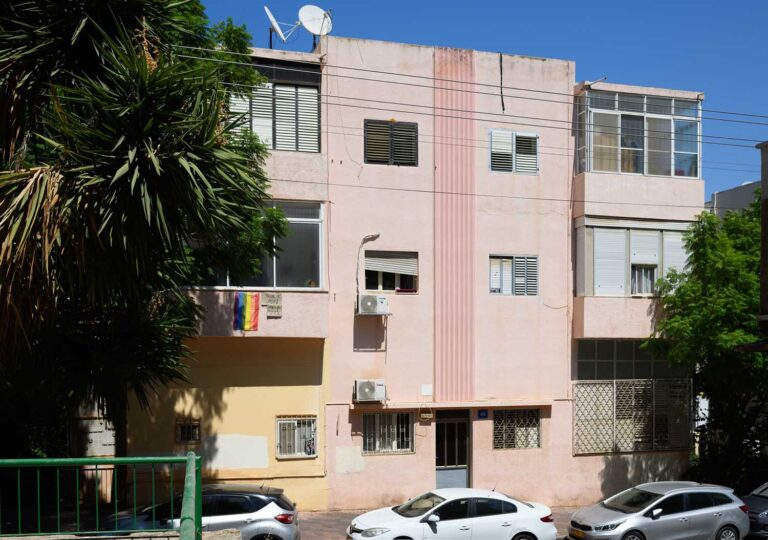
Michal Schwartz Ben Efrat: “I started cleaning, and slowly, they joined in”
Michal Schwartz Ben Efrat (72) is the oldest tenant in the building, and has lived there with her husband for the longest period. A well-known left-wing activist and a grandmother of four, she works for a union of Israeli and Palestinian workers.
“I am originally from Jerusalem,” says Schwartz Ben Efrat. “I also lived in Jaffa, then I came to Haifa in 2000. At first, we lived in a rented house. Then we bought this apartment in 2002, and we have lived here ever since.”
The couple's considerations were the diversity and the affordable prices.
“Our means were modest, and I also do not like living in neighborhoods that have only middle and upper class people,” she explains. “I like mixed neighborhoods, which have all kinds of classes and all kinds of people. I also loved the atmosphere. People who care about careers and things like that probably move to Tel Aviv, but for me Haifa is a saner city, cheaper, more of the people, more mixed, and more beautiful.
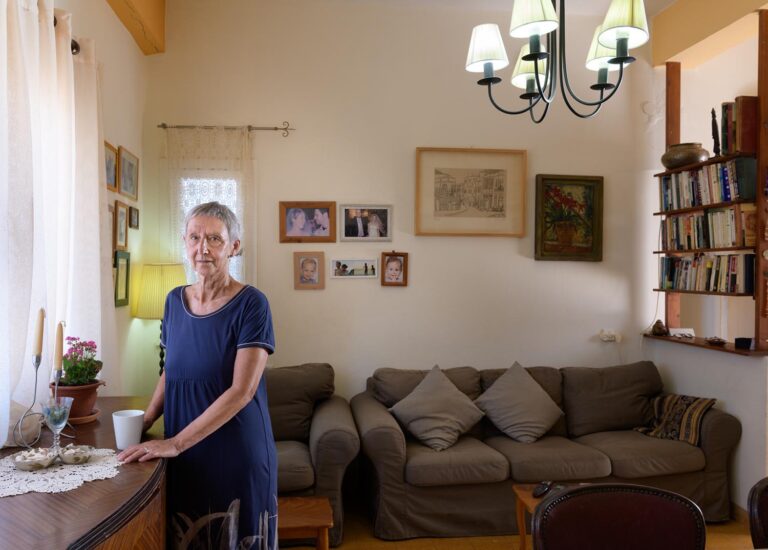
“On Fridays I go to the market, the buildings are ancient and beautiful, the neighborhood is very green, there is a beautiful view of the sea and a lot of air, and most importantly, there are beautiful relationships with people,” Schwartz Ben Efrat says.
When they got here, however, the neighborhood in general and their building in particular, were in a state of deterioration.
“The house was in bad condition, dirty, there was broken glass, syringes and the devil knows what. When I entered, there was no tenants association. I started to clean the entrance a bit, and slowly, more neighbors joined in.”
Schwartz Ben Efrat tells how one day, a large piece of plaster fell off the building, onto their balcony and the street. For her, that was the final straw.
“[I said], either we're renovating here, or I'm reporting to the municipality that the building is a dangerous structure,” she says.
She goes on to describe how people who lived in the building back then were different than now.
“Not everyone worked, not everyone paid, some were really old, some were immigrants. Over the years, more and more people came in, mostly young people. I don't know if they came together. Either a friend brought a friend, or they just met here, but something very charming was created here with a pleasant atmosphere in the building.
“Apart from me, there is one other older woman who lives here permanently, and another Palestinian guy, Fadi, who is a little younger than me and a father of seven daughters. He rents an apartment here, but he does not live here all the time, sometimes he uses it just for storage,” she says. “He is a significant partner in the building’s upkeep and is responsible for all the serious renovations here.”
Roni and Matan: “We really wanted the social aspect”
The entrance to the apartment of Roni Ben Zvi (33) and Matan Naamani (31), a couple who have lived in the building for about a year, is one of the most impressive in the building.
“Most of this, one of the two of us has created,” says Naamani. “Outside we have a beautiful corner, in which we wrote a line from a Cure song: ‘you make me feel like I'm home again.’ This is a song that symbolizes our relationship, and we wanted it to be at the entrance to our house.”
Naamani immigrated to Israel seven years ago from the United States.
“My first apartment was here in the neighborhood, on Nordau Street,” he says. “Both my great-grandparents and my great-grandfather lived on Nordau Street when they immigrated to Israel from Germany in 1933, and then they moved to Masada. One of the shops here on the street still belongs to my family.”
Ben Zvi has lived in the neighborhood for six years, and this is her fourth apartment here.
“A year ago, just before the second national lockdown, we moved in together, and we decided to live here,” she says.
“We really wanted the social aspect, to have friends and social gatherings, and we heard that in the first lockdown, the tenants here were very united. People were sitting out here together,” Naamani says.
“Another consideration was that unlike many other buildings in the neighborhood, it was very beautiful and cozy here,” says Ben Zvi. “When we came to see the apartment, we immediately saw all of [our neighbors] Ziv and Adva’s plants, Meital and Achinoam’s library, that the stairwell is a pleasant place, and that people have invested in the entrances of their homes.”
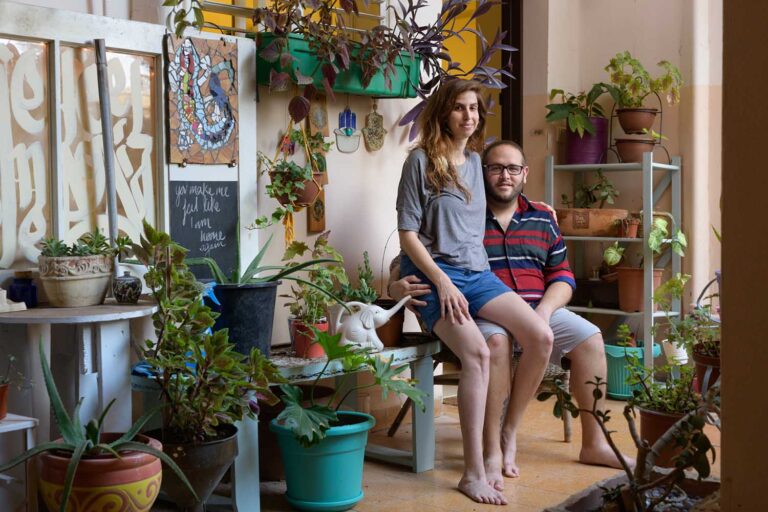
The longer the pair has lived on Masada Street, the more they realize that their initial impression was not misleading.
“On average, once or twice a day someone is looking for a lemon, a fork, or a tomato,” laughs Naamani. “Right now, for example, I'm waiting for Meital to finish teaching on Zoom because I need to print something for her.”
“And it’s more than that,” he adds. “When Ziv and Adva’s baby was born, we did some cooking among the tenants to help. Every night someone prepared a meal for them.”
Naamani tells how during Operation Guardian of the Walls in May, the neighborhood experienced violent clashes between Jewish and Arab residents.
“It was really important for me to go to a demonstration for coexistence in the neighborhood, and I asked the group if anyone would like to come with me,” he says. “It’s like a family, who take care of you. There's a lot of backup.”
Naamani goes on to explain that what happens in their building is not necessarily defined.
“The culture of the building is not to go into your apartment and close the door, but it's not that there's really a name for the social happening going on here. It's not a group, it's not a family, expectations and codes are not always clear,” he says.
Even in the neighborhood, the situation is not always easy. Ben-Zvi is a social worker for people with mental disabilities, and Naamani coordinates the rehabilitation program at the Tiberias Community Center, which is located just a few meters from the building. The repeated lockdowns have made their work more difficult.
On top of that, a nearby building was recently burned down.
“They tried to burn a grocery store, and the whole building burned down,” says Ben Zvi. “There has been a situation here for some time of crime families fighting each other. We’ve gotten used to it a bit. Not in a good way. It's just part of reality.”
Ben Zvi explains that the area is also undergoing a process of gentrification, where people from Israel’s center come buy apartments, renovate them, then rent them out at higher prices than the rest of the neighborhood.
“People who were born here sometimes can't afford it. We are part of the problem, but there are also positive things about young people coming here,” she explains. “It makes the municipality pay more attention and invest more in the neighborhood. It's shitty, but that’s the reality.”
According to her, people who live in the neighborhood are trying to prevent the price increases via raising awareness.
“There is a very active Facebook group for the neighborhood, and if someone advertises an apartment at an unreasonable price, people post it on the page,” she says.
They both love the neighborhood community, but to settle permanently? That’s a different question.
“We don’t have a clear answer,” admits Naamani.
Ben-Zvi adds, “I think about what it’s like to live in a building, not in a place with space and a yard. It scares me a lot that we might get to a point where it doesn't suit us anymore, because right now it's a place I really like to live in and don't want to leave.”
Achinoam and Yarden: “It’s fun to come home to neighbors”
Achinoam Katz (32) has lived two floors above Ben Zvi and Naamani for the past two years, after living in many different places. In the past year, her partner Yarden Baruch (29) moved in, and they plan to get married soon.
Katz is an educator and director of the northern region of BaKehila, a nonprofit that works with youth in impoverished neighborhoods. She has been volunteering for six years as an instructor for Choshen, a LGBTQ education organization. She also recently graduated from the Mandel Institute's leadership program.
“I have traveled a lot since my release from the army, mainly for work,” she says. “I came to Haifa with Yarden, two years ago. Haifa is a kind of intermediate choice. It is accessible to the center, still a big city, and on the other hand there is the Carmel [mountain range], there is a view, and there is also accessibility to the north and nature.”
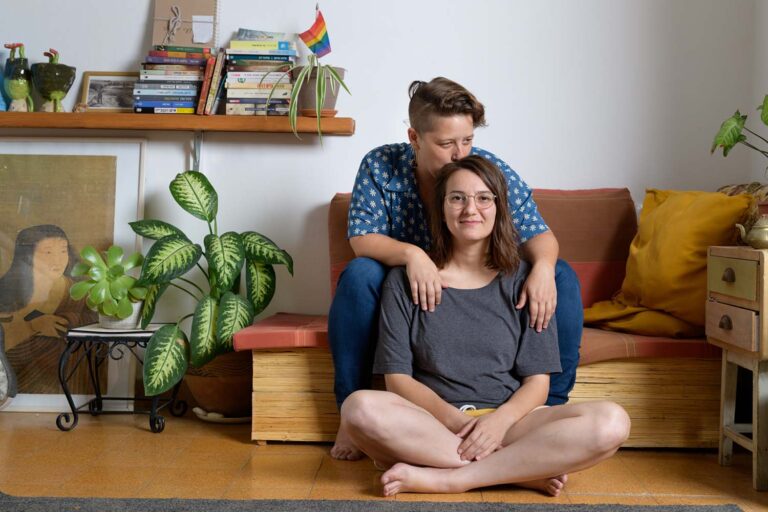
When the two decided to move in together, they debated whether to look for another apartment and began to look at apartments, “but nothing clicked. A big part of the decision to stay here was the atmosphere in the building, it's fun to come home to neighbors,” she says.
“If I have an issue, if I get stuck, I have someone to turn to. Meital has the key to our apartment. Once I came back from work, I was exhausted,I called her and asked her to turn on our hot water heater for me.”
The WhatsApp group started by the neighbors is called “A Cup and a Half of Sugar.”
“The group is very active and fun, you can always ask for things. There is an old-fashioned neighborhood atmosphere,” says Katz. “Knock on the door and ask for a glass of milk, take an interest in each other. During [the height of the pandemic], it was a real lifeline.”
Katz also helps the neighbors professionally.
“The areas of work of the tenants are very close to each other: education, therapy, yoga. Roni takes therapy tips from me, Meital and I build programs on sexuality together. Somehow people who work in these areas have gathered here. I always have someone to consult and share professionally with,” she says.
Katz loves the neighborhood’s mix of people, despite the presence of violence and crime and drugs.
“This is really a very diverse neighborhood. There are ultra-Orthodox, Russians, Ethiopians, local Arabs and also young Arabs with a queer scene for the LGBTQ people. I do not know any other neighborhoods that are so diverse.
“Yes, you hear shots in the street sometimes, and you see people on drugs in the streets, but if I don’t mess with them, they don’t mess with me. I do not feel unsafe on the street,” she continues.
Despite this, the two are not convinced that they will start a family here.
“When we talk about children, we ask ourselves if we will continue to live here. There are not so many playgrounds here, many cars are parked on the sidewalk, it is impossible to walk here on the street with a stroller,” she says. “We do not have children yet, so won’t leave yet.”
Ziv and Adva: “A culture has been created where you can ask for anything”
The new parents, Ziv Avraham (32) and Adva Bohbot, live on the ground floor.
“It took a while for the neighbors to find that Adva was pregnant,” says Avraham, “but as soon as Goni was born, a little over a month ago, we saw that every night, someone was preparing food for us.
“It makes me emotional. When you have a child, you expect a nice congratulations from the neighbors in the hallway or at most a bouquet of flowers, but cooking is a real investment, it is a really high level of friendship and concern.”
Avraham, a jazz pianist, came to Hadar in 2015 after returning from school in Ireland, and fell in love with the neighborhood. He bought the apartment three years ago.
“I was looking for a place to live, and I was with a friend at a party on the roof of this building,” he recounts. “As soon as we went out to the stairwell, which was just beautiful, I said to him, 'Wow, I want an apartment here.' Then we found out that the apartment on the ground floor was for sale.”
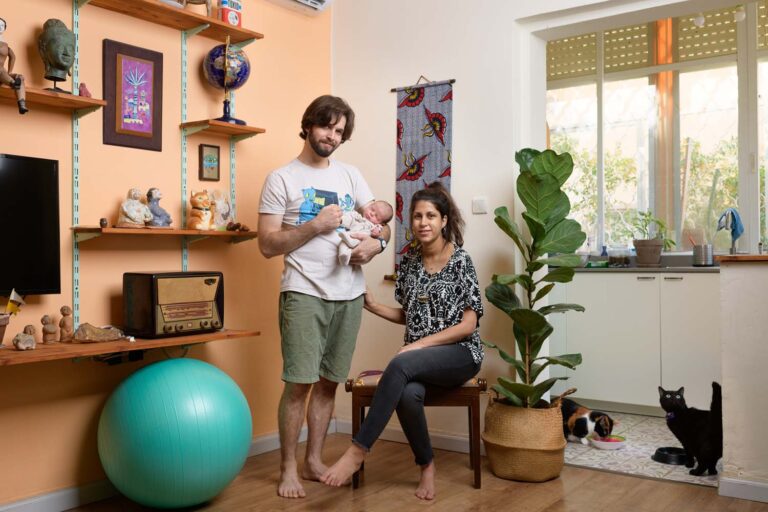
As the most long term residents of all the younger people, Avraham tells the story of how the WhatsApp group was founded. He says that he first met a neighbor when one of the hot water boilers in the building exploded. They went to each apartment to try and find out whose it was, getting to know all the neighbors in the process. After that, they decided to start the group.
“A culture has been created where you can ask for anything you need, from a cup of sugar to really weird requests,” he explains. “Adva and I once asked for a massage bed, and someone actually had one to give us! In time, even when the tenants in the building changed, we immediately made sure that they would fit in.”
Unlike the other young couples who are still debating the matter, Avraham and Bohbot decided to start a family in the building.
“Not that we planned it,” he says. “On the contrary, the thought was that it probably would not be here, but we really love this building, especially the people.”
However, they are also not sure that they will remain in the neighborhood into the long term future.
“All the good kindergartens and schools are outside the neighborhood. The neighborhood is in poor condition, and has deteriorated in the last year and a half of COVID-19,” he says.
“There is crime everywhere. There is no investment in anything related to security, there is a sense of lawlessness, the main investment in the neighborhood has been in student scholarships, and then really what happens is that students come and go and the neighborhood remains as it is.”
Meital Ezer: “If you are single, come to Hadar”
Many of the neighbors mention Meital Ezer (35), an educator, a lecturer on sex education and healthy sexuality and teacher of Hebrew to Arabic speakers. She lives alone on the first floor, opposite Achinoam and Yarden, in a smaller apartment.
“I am originally from Kiryat Haim, but I lived in many places in the country,” says Ezer. “Until 3 years ago, I lived in Beit She'an, where I moved for a relationship. I lived in there for two years, I had a job there, I had connections.
“After the breakup, I went back to my parents a bit, and finally rented this apartment. I was heartbroken after a very difficult breakup,” she continues. “After I decided to move to Haifa, I started finding out about neighborhoods in the city with young people. I called a friend and she said to me: ‘Meital, if you are single and you want to meet people and get involved, come to Hadar.’”
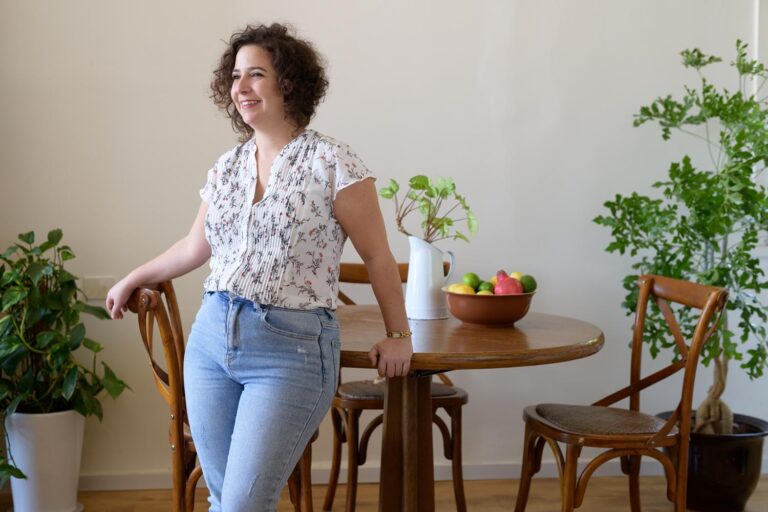
She tells how she found the apartment on Facebook, sitting in a cafe on Masada Street. She decided to move in immediately upon seeing it.
“I felt it was a good place to deal with the breakup. It seemed like a warm place, to wrap me up,” she says.
She has felt the mutual involvement in each others’ lives since her first day.
“I didn't have a washing machine yet, and I went down to the street with a laundry bag to look for laundry,” she tells. “I was a little lost, and then someone asked, 'Are you looking for something?' That is something that doesn’t happen anymore.”
She is not surprised that the neighbors mention her as an energizing force in the building.
“It’s in my character a bit,” she laughs. “Somehow it turned out that I was in a pretty personal relationship with all the tenants. When I arrived the atmosphere was already there, I did not start the WhatsApp group, but I did fit in well.”
The atmosphere in the building helped her deal with her heartbreak.
“For the first half year, I would come from work to the gym to home, and close the door. Once I decided I needed to get out, I invited everyone over for dinner,” she says.
“When the second lockdown came, three apartments turned over [to new residents], and for me it was a bit of a crisis. So just before the lockdown, I hosted another dinner, so we could get to know each other. And I did a Purim gift-exchange twice, and invited everyone for Hanukkah as well.”
The pandemic period was formative in the building, says Ezer.
“Something about corona actually took us out of the loneliness, and it saved me,” she explains. “In the first lockdown they announced that a joint household could be together. At that time most people in the building lived alone in their apartment, and we said, what is a joint household? So we became a bit of a joint household.”
But despite her love for the neighborhood, she refuses to use the word “community” about the neighborhood.
“I do not like to say that Hadar is a community. It is not. There may be an atmosphere of community here, people communicate with each other, but in the end everyone has their life. There are cliques, there is no commitment here. There is such talk, but I do not think there is one word that defines what we are.”






